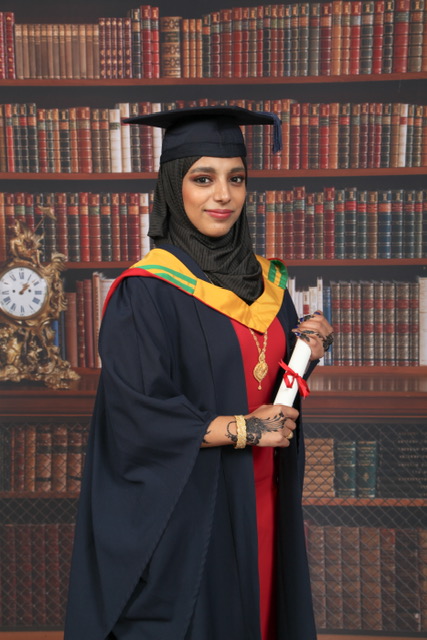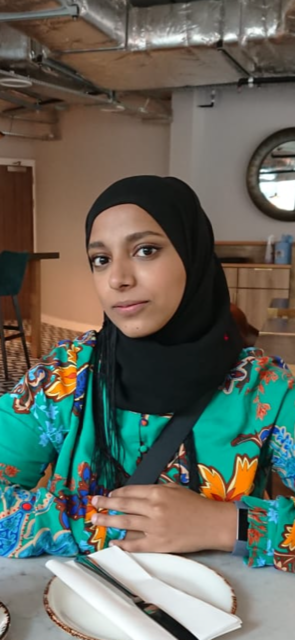A career in social work is about so much more than just working with children - and this Liverpool Hope University graduate is living proof of that fact.
Merfat Musleh completed a BA in Social Work at Hope, graduating in 2020.
Rather than working for a local authority, which can be a common career pathway for a social worker, Merfat has opted to work in the third sector.
For Merfat, being embedded in a charity has equipped her to really affect change and make a difference. And her work with the charity Savera UK is vitally important.

Savera UK is a specialist organisation with a national remit and which campaigns to eliminate ‘honour’-based abuse (HBA) and harmful practices, including forced marriage and female genital mutilation (FGM).
It also provides confidential, life-saving services to those at risk - regardless of age, culture, sexuality or gender – and works with key partners to conduct research, deliver training, raise awareness and provide one-to-one support to those at risk.
Merfat, a specialist HBA Support Worker, was kept particularly busy during the pandemic, when Savera UK experienced a spike in calls for help.
And Merfat has urged other social work graduates to consider operating in the third sector, too.
The 25-year-old adds: “I didn’t start working for a local authority - and there’s a reason for that. At Hope we were taught about all the different definitions of social work.
“And that fed into my passion because I knew I wanted to do something more direct than, say, the procedural-based environment of social services. I wanted more flexibility in how I’m able to support someone, using my own creativity.
“And I’d argue we need more trained social workers operating in the third sector. I’m in the minority, yet it fits perfectly into the category of what a social worker really is - it’s safeguarding while also being an advocate for our clients. Crucially, it’s also about social justice and equality.”

Harmful practices and HBA cover a wide range of behaviours deemed to be ‘dishonourable’ in the eyes of perpetrators, from simply dressing outside family or cultural norms to refusing a marriage.
Savera UK says those who practice HBA and other harmful traditions believe what they are doing is right and often do not consider the practices as harmful or abusive. The perpetrator’s concern centres on how they will be seen by their extended family or the wider community if they do not protect the practice and adhere to the believed cultural norms.
The consequences for those at risk can be grave - including physical and physiological trauma, abandonment and even death.
There are an estimated 12 ‘honour’ killings a year in the UK and last year 141 of the referrals received by Savera UK were relating to victims of - or those at risk of - HBA and harmful practices
The most recent stats from Merseyside Police – where Savera UK is headquartered - show that in the 12 months between April 2020 and March 2021, a total of 30 incidents of ‘honour’-based abuse were reported to the force. Fewer incidents of Forced Marriage and FGM were reported.
But Savera UK says the figures represent an ‘under-reporting’ of ‘honour’-based abuse and other harmful practices – and it remains an issue for the region.
Savera UK says that while these numbers provide part of the picture locally, the true amounts of those at risk of ‘honour’-based abuse is not known due to the hidden nature of these crimes.
Merfat, whose family is from Yemen, says there are concerns that the wreckage wrought by the Covid-19 crisis may ultimately increase the number of recorded fatalities.
She says that one way to improve support for those at risk or under threat is to improve the way ‘honour’-based abuse cases are risk assessed by authorities – even if it requires changes to the law itself.
Merfat reveals: “One of our biggest challenges as an organisation is actually being able to define ‘honour’-based abuse and having a uniform definition that all associated professionals follow.
“What often happens is that we have cases labelled domestic abuse or violence, without taking into consideration the complex nature of families where culture and ‘honour’ is a major factor, bringing pressure and duress by close, extended family and the wider community.
“Fundamentally, it’s about people understanding what ‘honour’-based abuse really is.
“We need to ask - does the current Domestic Abuse Act, which became law in April 2021, really take into consideration the complex needs of migrant women and ‘honour’-based abuse? How are we able to really ensure that our clients are properly protected?
“Because if the cases we deal with are treated as ‘domestic abuse’, we feel this doesn’t go far enough in terms of the underlying problems.”
In terms of practical interventions, Savera UK offers one-to-one emotional support to victims and those at risk, as well as advocacy support, in conjunction with agencies like the police and social services.

** Liverpool Hope University has launched a programme, in conjunction with Liverpool City Council, designed to get more social workers from Black and Global Majority groups employed in the profession.
The initiative is called Bridging the Gap: A Route Into Social Work and it has seen the University create 15 extra spaces on Hope’s Social Work degree programme exclusively for those from under-represented communities and Global Majority groups who currently live in the Liverpool city region.
That includes Black, Asian, Chinese, Bangladeshi, Indian, Pakistani, Yemeni, Somali, Black African and Black Caribbean communities - and a whole lot more besides
Bridging the Gap starts in September 2022 but Hope is encouraging applicants to apply now. Interviews will take place from December 2021 onwards. For all enquiries email socialwork@hope.ac.uk.
Bridging the Gap is open to anyone living in the Liverpool City Region Combined Authority, which incorporates the councils of Halton, Knowsley, Sefton, St Helens, and Wirral.
To apply for the Bridging the Gap route into social work simply email socialwork@hope.ac.uk in the first instance in order to express an interest. The Social Work team at Hope will then simply guide you through the process from that point on. Again, just email socialwork@hope.ac.uk saying you're interested in Bridging the Gap.
www.hope.ac.uk/socialsciences/studywithus/bridgingthegap



